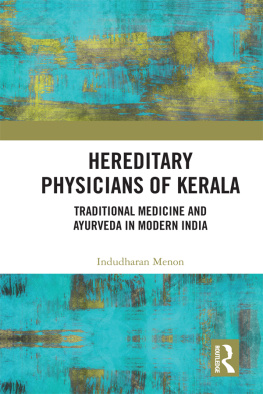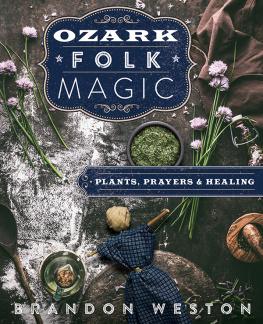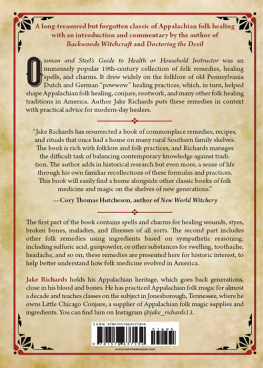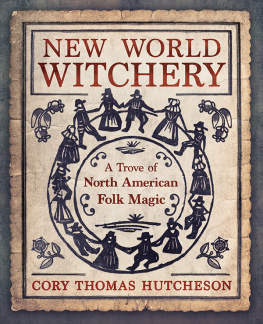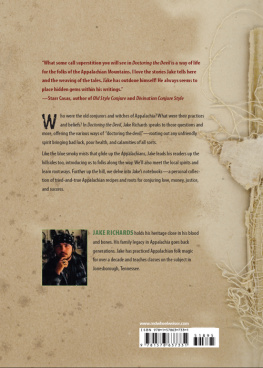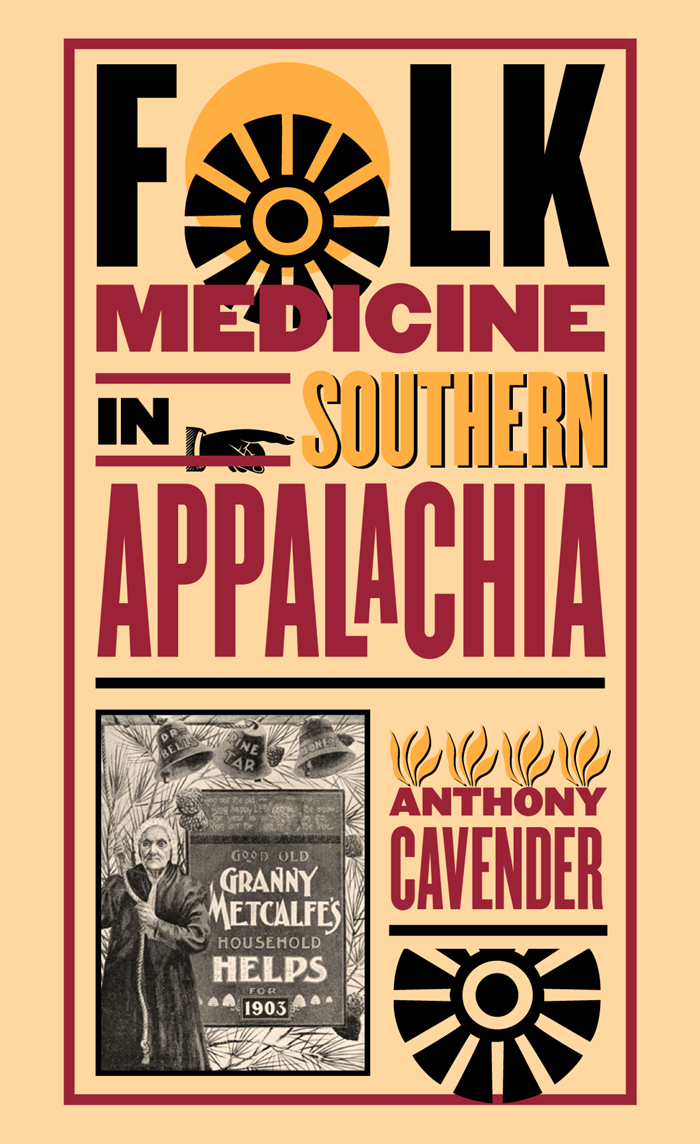Contents
FOLK MEDICINE IN SOUTHERN APPALACHIA
2003 The University of North Carolina Press
All rights reserved
Designed by April Leidig-Higgins
Set in Ehrhardt by Copperline Book Services, Inc.
Manufactured in the United States of America
The author and the publisher are not engaged in rendering medical services, and this book is not intended to diagnose or treat medical or physical problems. Any reader with medical or related needs should secure the services of a medical expert. This book is sold without warranties of any kind, express or implied, and the publisher and author disclaim any liability, loss, or damage caused by the contents of this book.
The paper in this book meets the guidelines for permanence and durability of the Committee on Production Guidelines for Book Longevity of the Council on Library Resources.
Library of Congress Cataloging-in-Publication Data Cavender, Anthony P.
Folk medicine in southern Appalachia / Anthony Cavender.
p. cm.
Includes bibliographical references and index.
ISBN-13: 978-0-8078-2824-3 (cloth: alk. paper)
ISBN-10: 0-8078-2824-6 (cloth: alk. paper)
ISBN-13: 978-0-8078-5493-8 (pbk.: alk. paper)
ISBN-10: 0-8078-5493-x (pbk.: alk. paper)
1. Traditional medicine Appalachian Region, Southern History. 2. Traditional medicineAppalachian Region, Southern Formulae, receipts, prescriptions. 3. Medicinal plants Appalachian Region, Southern. 4. Materia medicaAppalachian Region, Southern.
[DNLM: 1. Medicine, TraditionalhistoryAppalachian
Region. wz 309 c379f 2003] I. Title.
GR108.15.c38 2003
398.3530974 dc21
2003010305
cloth 07 06 05 04 03 5 4 3 2 1
paper 10 09 08 07 06 7 6 5 4 3
THIS BOOK WAS DIGITALLY PRINTED.
To Norbert F. Riedl and Michael H. Logan
CONTENTS
ILLUSTRATIONS
PREFACE
Contrary to the enduring notion of Southern Appalachia as a world apart from the rest of America, this book is premised on an inclusionist orientation, which is to say that Southern Appalachian folk medicine is best understood within the larger context of Euro-American folk medicine. There never was nor is there now a variety of folk medicine unique to Southern Appalachia. To be sure, one can identify nuances of difference in comparison to other Euro-American populations. The fundamental folk medical beliefs used by Southern Appalachians to explain the cause of illness, however, are not peculiar to them. The same beliefs have been well documented among Euro-American populations in other parts of the country as well as among African Americans.
To some observers, past and present, the distinctiveness of Southern Appalachian people is situated not in ethnicity, for it would be problematic to argue that they are a distinct ethnic group, but rather in the commonly accepted belief that they were victimized by culture lag due to geographical isolation. As with other beliefs about Southern Appalachians, however, there is as much that rings false about the idea of culture lag as rings true. It is undeniable that some folkways persisted in the region long after they had been discarded by the more progressive Euro-American middle and upper classes in the North. One can easily summon examples of folk medical beliefs and practices in Southern Appalachia that have endured from the late eighteenth century to the present. This study does not dismiss the persistence of folk medicine, nor the presence of an impoverished, under-educated segment of the population that has long been viewed, quite incorrectly, as representative of the region and as the sole bearer of folk medical knowledge. The inclusionist orientation of this study, however, also recognizes the presence in the nineteenth century of a middle class of farmers and merchants and an elite class of large landholding farmers, entrepreneurs, doctors, and lawyers. These people were well educated and curious about the outside world. They were also significant agents of internal cultural change. Ignoring the existence of social stratification, as so many observers in the past did, in effect precluded an understanding of how folk medicine in Southern Appalachia evolved over time and, more important, how it mirrored the changing health care environment of America. The parallel development of the health care environment of Southern Appa-lachia at the turn of the twentieth century is attributable to industrialization, the active involvement of various benevolent organizations in improving public health, and curriculum reform in the medical schools. Even before these events, however, folk medicine in the region mirrored developments in official and popular medicine as a result of the peoples exposure to domestic medicine books, newspapers, almanacs, and patent medicine promotional literature, as well as their direct contact with physicians and patent medicine peddlers. In this context, Southern Appalachia was not shut off from the rest of America at all; to the contrary, it was very much part of it.
In part a historical construction of the folk medical beliefs and practices common in Southern Appalachia from the late nineteenth century to the Second World War, this study begins with a brief overview of the history of folk medicine scholarship in the region, focusing on its limitations in relation to prevailing notions about folk medicine and the people of Southern Appalachia. critically reviews recent research done by anthropologists, folk-lorists, and physicians from roughly 1970 to the present that, aside from indicating folk medicines resilience and persistence, considers its patterns of use and impact on the health care behavior of Southern Appalachians today.
ACKNOWLEDGMENTS
This book has been long in the making, and in the course of its development I have incurred many debts. First and foremost, I must thank the many people in Southern Appalachia who over the years welcomed me into their homes, generously shared what they knew about folk medicine and related topics, and on many occasions provided a sumptuous country meal. I thank all the students who took my course on Appalachian folk medicine at East Tennessee State University. Their course research projects resulted in an abundance of primary source materials cited in this book.
I am grateful for the assistance of many of the faculty and staff of East Tennessee State University, some of whom deserve special mention. Norma Myers, Ned Irwin, and Georgia Greer of the Archives of Appalachia were instrumental in identifying and locating valuable primary source documents and illustrations. Interlibrary loan librarian Kelly Hensley was indefatigable in locating obscure secondary sources. Much is owed to Robin Feierabend, Judith Hammond, and Roberta Herrin, who carefully read early drafts of the manuscript and offered worthy suggestions for its improvement. I have also benefited over the years from my collegial association with Richard Blaustein, a longtime student of folk medicine. The theoretic orientation of this book was shaped in large measure by discussions with fellow members of the Culture and Medicine Study Group at East Tennessee State University. Founded by Gary Burkette and supported by the Department of Family Medicine, the culture club, as we liked to call it, included anthropologists, clinical psychologists, family medicine physicians, folklorists, nurses, psychiatrists, and sociologists who met periodically to discuss a variety of topics related to the cultural context of health, illness, and healing. Regrettably, the culture club no longer exists, but this book is a legacy of its profound influence on the way I think about folk medicine.


